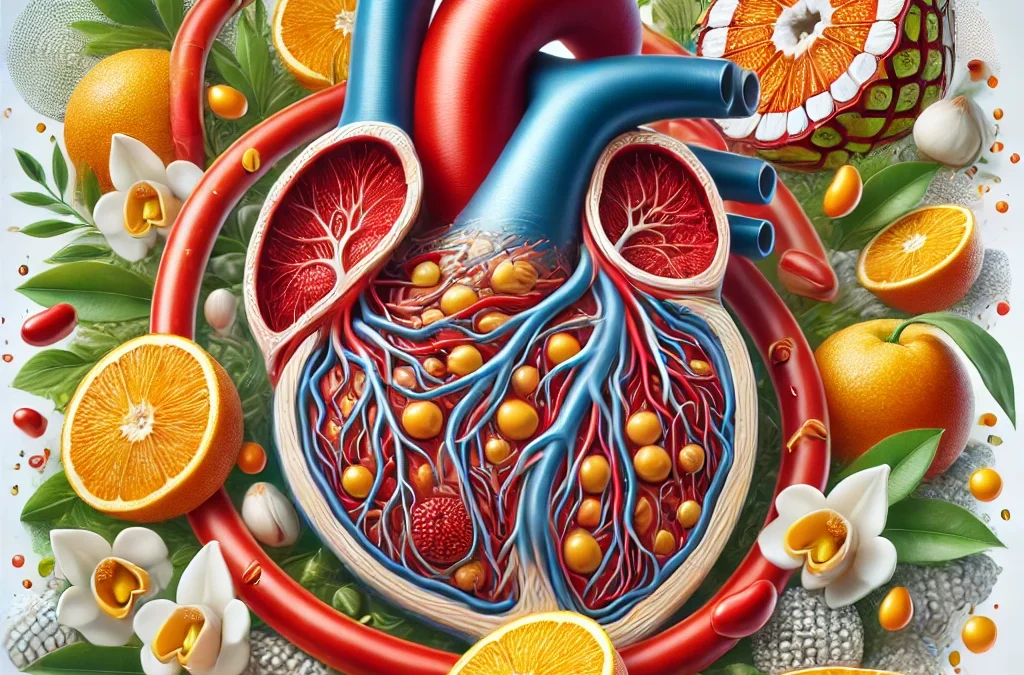I recently wrote a blog about the health benefits of citrus bioflavonoids. Today, I am beginning a series of blogs exploring some of the ingredients derived from citrus bioflavonoids and their benefits to our daily lives. Since cardiovascular health is the number one killer in America, I think starting with Sytrinol is the best approach.
What is Sytrinol?
Sytrinol is a patented blend of natural citrus flavonoids (polymethoxylated flavones or PMFs) and palm tocotrienols that has gained recognition for its ability to support cardiovascular health.
As stated in my original blog, citrus bioflavonoids have been shown to support cardiovascular health by improving blood circulation and reducing blood pressure. They help to strengthen capillaries, prevent the oxidation of LDL cholesterol, and improve overall heart function. [i] Let’s see what the science with Sytrinol says.
Cholesterol Management
One of the most well-documented benefits of Sytrinol is its ability to lower cholesterol levels. Several clinical studies have demonstrated that Sytrinol can significantly reduce total cholesterol, low-density lipoprotein (LDL, also known as “bad” cholesterol), and triglycerides.
Scientific Evidence: In a double-blind, placebo-controlled study, participants who took 300 mg of Sytrinol daily for 12 weeks experienced a 30% reduction in total cholesterol, LDL cholesterol by 27%, and triglycerides by 34% reduction. These changes occurred without significantly impacting high-density lipoprotein (HDL, or “good”) cholesterol.[ii]
How does Sytrinol achieve this benefit?
Sytrinol inhibits the enzyme HMG-CoA reductase[iii], which plays an essential role in cholesterol production in the liver. It also helps reduce oxidative stress (free radical damage).
Free radicals can cause the oxidation of lipids, proteins, and DNA. They can also cause the oxidation of LDL cholesterol, which is a critical step in the narrowing of arteries. They can also damage the mitochondria, the energy factories of every cell. Mitochondrial dysfunction leads to decreased energy production in cardiac cells and can impair cardiac muscle function.[iv]
BONUS: Improved Lipid Profiles Without Diet Changes[v]
One of Sytrinol’s most attractive features is its ability to improve lipid profiles without requiring drastic dietary changes. While diet and lifestyle play critical roles in heart health, Sytrinol works independently of dietary fat intake to reduce cholesterol and triglyceride levels. This makes it an appealing option for individuals who may struggle with maintaining strict dietary modifications.
Sytrinol: A pivotal component to your heart health supplement regimen
Sytrinol offers a natural, safe, and effective solution for managing cholesterol and supporting overall heart health. Its unique blend of citrus flavonoids and tocotrienols works synergistically to lower LDL cholesterol, triglycerides, and oxidative stress while supporting healthy blood vessels. With strong scientific evidence backing its benefits, Sytrinol is an excellent choice for anyone looking to improve their cardiovascular health without the side effects of pharmaceutical drugs.
References:
[i] Mahmoud AM, Hernández Bautista RJ, Sandhu MA, Hussein OE. Beneficial Effects of Citrus Flavonoids on Cardiovascular and Metabolic Health. Oxid Med Cell Longev. 2019 Mar 10;2019:5484138. doi: 10.1155/2019/5484138. PMID: 30962863; PMCID: PMC6431442.
[ii] Roza JM, Zheng CN, Najila G. Effect of citrus flavonoids and tocotrienols on serum cholesterol
levels in hypercholesterolemic subjects. Altern Ther Health Med. 2007;6:44
[iii] Parker et al., J. Biol. Chem. 1993; 268:11230-11238
[iv] Stamerra CA, Di Giosia P, Giorgini P, Ferri C, Sukhorukov VN, Sahebkar A. Mitochondrial Dysfunction and Cardiovascular Disease: Pathophysiology and Emerging Therapies. Oxid Med Cell Longev. 2022 Aug 2;2022:9530007. doi: 10.1155/2022/9530007. Retraction in: Oxid Med Cell Longev. 2024 Jan 9;2024:9785792. doi: 10.1155/2024/9785792. PMID: 35958017; PMCID: PMC9363184.
[v] Roza JM, Xian-Liu Z, Guthrie N. Effect of citrus flavonoids and tocotrienols on serum cholesterol levels in hypercholesterolemic subjects. Altern Ther Health Med. 2007 Nov-Dec;13(6):44-8. PMID: 17985810.


